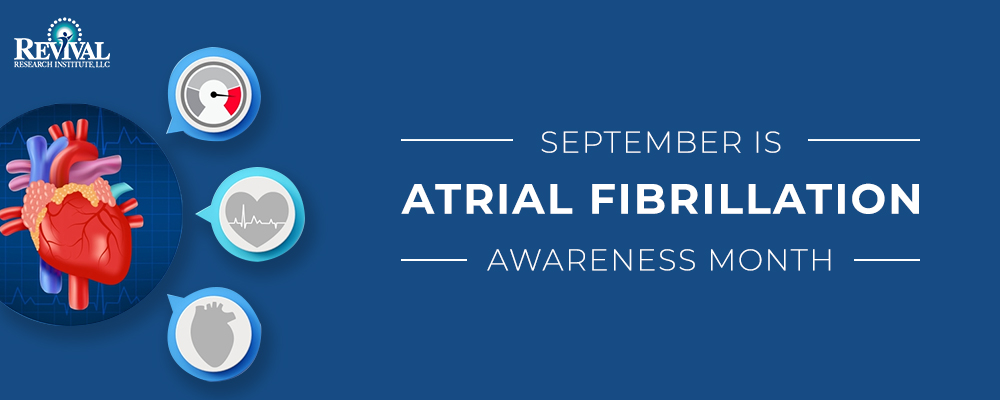Updated on September 25, 2023
Introduction to Afib Awareness Month
Atrial fibrillation is the most common type of arrhythmia that people seek treatment for at hospitals or healthcare facilities. It causes more than 350,000 hospitalizations each year, with experts suggesting that one in four people above 40 years is likely to suffer from this condition.
This National Atrial Fibrillation Awareness Month, Revival Research Institute wants to highlight the importance of early recognition and appropriate treatment for atrial fibrillation. This blog will aim to raise awareness by giving people an understanding of what atrial fibrillation is and what they can do during this National Afib Awareness Month Awareness Month to possibly improve their health. Continue reading this blog to find out more information on AFib.
What is Atrial Fibrillation?
Atrial Fibrillation is the irregular heartbeat or rhythm of the heart. It happens when the heart fails to contract as it should normally do because of malfunctioning of the pacemaker of the heart. This pacemaker is located in the upper right chamber of the heart known as the atria.
If left untreated, AFib can cause a plethora of heart diseases such as stroke or heart failure. Not surprisingly, having AFib increases the risk of ischemic stroke by 3 to 5 times. This National Atrial Fibrillation Awareness Month let’s dive into the heart chambers and fully discover AFib.
Symptoms of AFib
About two-thirds of AFib patients experience symptoms that can feel like butterflies fluttering or a fish flopping around in the chest. However, one-third of those who live with AFib, are unaware of themselves having this condition. Often, they do not find this out until they have a sudden diagnosis for surgery. Sadly, many do not find this out until after they have had an episode of stroke.
Some individuals with atrial fibrillation may not display any symptoms and may remain unaware of their condition for extended periods. Let’s shed some light on the symptoms of AFib this National Atrial Fibrillation Awareness Month:
- Palpitations
- Chest discomfort
- Decreased exercise capacity
- Weakness
- Fatigue
- Shortness of breath
- Dizziness
- Cognitive confusion
Atrial fibrillation can manifest as episodes where patients experience symptoms briefly before their heart rhythm spontaneously returns to normal. In contrast, some people experience non-stop atrial fibrillation, where the heart rhythms do not return to normal on their own.
Medical treatment or other interventions may be necessary to restore a normal heart rhythm for those with persistent atrial fibrillation. Individuals having long-standing persistent atrial fibrillation may have to tackle symptoms for extended periods. This makes appropriate treatment necessary for their heart to return to a regular rhythm.
Is it Atrial Fibrillation or just Heart Palpitations?
Do you sometimes feel that your heart is skipping beats? Well, it could be just heart palpitations or a sign of something more serious. On this National Atrial Fibrillation Awareness Month, we would like to highlight the key difference between the two often confused conditions. Although very common, heart palpitations are mostly not something to worry much about at first and are one of the signs of atrial fibrillation. Along with this, atrial fibrillation also causes fatigue, light-headedness, shortness of breath, chest pain, decreased blood pressure, and a racing heart.
Treatment Options for Atrial Fibrillation
On this National Atrial Fibrillation Awareness Month, we would like to emphasize the need for better diagnosis of this condition. Oftentimes, an overactive thyroid may be the reason behind irregular heartbeats. After being correctly diagnosed with AFib, your doctor may recommend certain treatment options based on your age, symptoms, and overall health status. These could be:
Medication that stabilizes heartbeat and helps manage atrial fibrillation
- Pills to reduce the chances of a stroke
- Cardioversion (electric shock treatment)
- Catheter ablation
- Fitting of a pacemaker in your heart
- Potential treatment option via Revival Research Institute’s clinical trials (more on this in the next section)
Learn more about cryptogenic stroke and underlying atrial fibrillation here.
A Word from Revival
Revival Research Institute is a leading clinical research Institute in Michigan and carries out multiple clinical trials in the arena of cardiology. This National Atrial Fibrillation Awareness Month, Revival fully recognizes the need to advance medical treatments and offer people alternatives for atrial fibrillation. And so, it provides them with an alternative option in the form of its AFib clinical trials. Our team of professionals will be more than happy to provide more information to you about AFib and AFib clinical trials.
The Takeaway
The National Atrial Fibrillation Awareness Month is an important time to educate the masses about atrial fibrillation. In 2009, the US government officially designated the whole month of September for this. Despite projections indicating that AFib will affect 12.1 million people in the United States by 2030, there is very little awareness about this common condition. What is more alarming is that many people with AFib don’t even know they have it and are at high risk for complications like stroke or heart failure.
Revival Research Institute has placed itself as a key player in the arena of cardiology clinical trials by collaborating with expert physicians and cardiologists. Our network of expert professionals is spanned across multiple locations in the United States. We welcome you to participate in our trials and help us potentially transform the future of atrial fibrillation.





